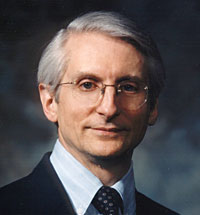Peter J. Denning
Born January 6, 1942, New York City; computer scientist whose work on virtual memory systems helped make virtual memory a Permanent Part of modern operating systems.

Education: BEE, Manhattan College, 1964; SM, electrical engineering, MIT, 1965; PhD, electrical engineering, MIT, 1968.
Professional Experience: assistant professor, electrical engineering, Princeton University 1968-1972; Purdue University: associate professor, 1972-1975; professor of computer sciences, 1975-1984, head, Computer Sciences Department, 1979-1983; Research Institute for Advanced Computer Science (RIACS), NASA Ames Research Center, Mountain View, Calif.: founding director, 1983-1990, research fellow, 1990-1991; associate dean for computing and chair of the Computer Science Department, School of Information Technology and Engineering, George Mason University, 1991-present.
Honors and Awards: teaching award, Princeton University, 1971; ACM Service Award, 1974; two best paper awards: "The Working Set Model for Program Behavior," Comm. ACM, May 1968; and "Operating Systems Principles and Undergraduate Computer Science Curricula," Proc. Spring Joint Computer Conference, 1972; fellow, IEEE, 1981, for "contributions to the understanding of virtual memory systems and the development of the working set concept"; fellow, American Association for the Advancement of Science, 1984, "for outstanding contributions to computer systems development and computer security, and for service to the profession and to his professional society"; doctor of law, Concordia University, 1984; doctor of science, Manhattan College, 1985; ACM Distinguished Service Award, 1989; Centennial Engineering Award, Manhattan College, 1992.
Peter J. Denning is associate dean for computing and chair of the Computer Science Department in the School of Information Technology and Engineering at George Mason University. He took up this appointment in August 1991.
Denning was the founding director of the Research Institute for Advanced Computer Science (RIACS) at the NASA Ames Research Center in Mountain View, Calif. He served in that capacity from 1983 to 1990, when he stepped down and became research fellow until August 1991.
Before accepting the RIACS assignment, Denning was head of the Computer Sciences Department at Purdue University; where he was a professor of computer sciences (1975-1984) and an associate professor (1972-1975). He was an assistant professor of electrical engineering at Princeton University (1968-1972). Denning was one of the four cofounders of the CSNET, which began with NSF support and evolved into the first fully self-supporting community network; CSNET is a predecessor of the NSFNET and the NREN. He has worked closely with NASA on computational science and on the high-performance computing and communications program.
Denning's primary research interests are computer systems architecture, parallel computation, operating systems, performance modeling, and organizational informatics. He has published over 230 papers and articles since 1967. His work on virtual memory systems helped make virtual memory a permanent part of modern operating systems. His book with E. G. Coffman, Jr., Operating Systems Theory, was published by Prentice-Hall in 1973 and is still widely used today. His book with Jack Dennis and Joseph Qualitz, Machines, Languages, and Computation, was published by Prentice-Hall in 1978. His edited collection, Computers Under Attack: Intruders, Worms, and Viruses, published by Addison-Wesley in fall 1990, is a best-seller.
Denning was the president of the Association for Computing Machinery (1980-1982). He has participated actively in the ACM since 1968, where he has served as chairman of the Special Interest Group on Operating Systems (SIGOPS) (1969), chairman of the Board on Special Interest Groups (1970-1974), member-at-large of Council (1974-1978), and vice president (1978-1980). In June 1984 he retired from Council after 14 years of service. He served as chairman of the Task Force on the Core of Computer Science (1986-1988), as chair of the ACM Editorial Committee, and member of the Publications Board (1986-1992). He was elected chair of the Publications Board in 1992.
Denning served as editor-in-chief of the Communications of the ACM (1983-1992), which under his guidance has become the leading technical magazine in computing. During this period, he radically altered the character of the journal from a research publication to an up-to-date communication for practitioners. He continues as a contributing editor of the Communications. He is an associate editor of Acta Informatica. He was consulting editor for computer science for the MIT Press, editor-in-chief of ACM's Computing Surveys, and editor of the Elsevier/North-Holland Series on Operating and Programming Systems. He was writer of the column, "The Science of Computing," in each issue of American Scientist from January 1985 through October 1993.
BIBLIOGRAPHY
Significant Publications
Denning, Peter J., "The Working Set Model for Program Behavior," Comm. ACM, Vol. 11, No. 5, May 1968, pp. 323-333.
Denning, Peter J., "Operating Systems Principles and Undergraduate Computer Science Curricula," Proc. Spring Joint Computer Conference, Vol. 40, 1972,pp.849-855.
Denning, Peter J., and E.G. Coffman, Jr., Operating Systems Theory, Prentice-Hall, Englewood Cliffs, NJ., 1973.
Denning, Peter J., Jack Dennis, and Joseph Qualitz, Machines, Languages, and Computation, Prentice-Hall, Englewood Cliffs, NJ., 1978.
Denning, Peter J., Computers Under Attack: Intruders, Worms, and Viruses, Addison-Wesley, Reading, Mass., 1990.
UPDATES
Portrait changed (DCW, 2013)
New content Copyright © 2013-2023 by the IEEE Computer Society and the Institute of Electrical and Electronics Engineers Inc.
All rights reserved. This material may not be reproduced or redistributed without the express written permission of the copyright holder.
